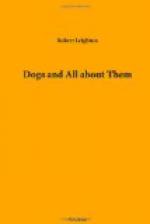The person attacked has yet another remedy. He can, if he is able, kill the dog before it can bite him, but he is not justified in shooting the animal as it runs away, even after being bitten.
By 28 and 29 Vict., c. 60, the owner of a dog which attacks sheep or cattle—and cattle includes horses—is responsible for all damage, and there is no necessity to prove previous evil propensities. This Act is wholly repealed by the Act called the Dogs’ Act, 1906, which came into force on January 1st, 1907, but the new Act re-enacts the section having reference to damage to cattle, and says that in such cases it is not necessary for the persons claiming damages to show a previous mischievous propensity in the dog or the owner’s knowledge of such previous propensity or to show that the injury was attributable to neglect on the part of the owner; the word “cattle” includes horses, asses, sheep, goats, and swine.
The Law looks upon fighting between dogs as a natural and necessary incident in the career of every member of the canine race, and gives no redress to the owner of the vanquished animal, provided the fight was a fair one, and the contestants appear to consider it so. The owner, however, of a peaceably disposed dog which is attacked and injured, or killed, by one savage and unrestrained, has a right of action against the owner of the latter. The owner of the peaceably disposed animal may justifiably kill the savage brute in order to save his dog, but he must run the risk of being able to prove that this was the only means of putting a stop to the fight.
LICENCES
Every dog owner must annually take out a licence for each dog he keeps. The licence, which is obtainable at all post-offices at the cost of 7s. 6d., is dated to run from the hour it is taken out until the following 31st December. The person in whose custody or upon whose premises the dog is found will be deemed its owner until proved otherwise.
The owners of certain dogs for certain purposes are, however, exempted from taking out licences, viz.: (1) Dogs under the age of six months; (2) hounds under twelve months old neither used nor hunted with the pack, provided that the Master has taken out proper licences for all hounds entered in the pack; (3) one dog kept and used by a blind person solely for his or her guidance; (4) dogs kept and used solely for the purpose of tending sheep or cattle or in the exercise of the occupation or calling of a shepherd.
MUZZLING REGULATIONS
Under the Contagious Diseases (Animals) Acts, 1878-1894, local authorities (i.e., county, borough, or district councils) were empowered to issue orders regulating the muzzling of dogs in public places and the keeping of dogs under control (otherwise than by muzzling). Offenders under these Acts are liable to a fine not exceeding P20.




